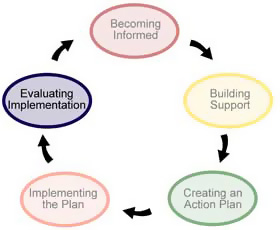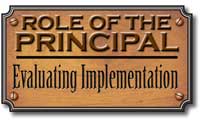How can schools assess whether or not the RTI approach is effective?
Page 18: Fidelity of Implementation
 Evaluating implementation is the final step in the change process. This step is critical for determining whether an intervention has been effective. During this step, school personnel perform two important tasks: assessing the fidelity of implementation and evaluating outcome data.
Evaluating implementation is the final step in the change process. This step is critical for determining whether an intervention has been effective. During this step, school personnel perform two important tasks: assessing the fidelity of implementation and evaluating outcome data.
Fidelity of RTI implementation is the extent to which staff adhere to RTI procedures as they were designed, intended, and planned. If staff alter or stray from the implementation procedures used in the validation research, their changes could affect the approach’s effectiveness and consequently cause the approach to fail. It is important to monitor the fidelity of implementation for the main components of RTI, (i.e., universal screening, high-quality instruction, progress monitoring, and data-based decision making). Although school personnel might implement one component (e.g., high-quality instruction) correctly, it is possible that they might not implement another component (e.g., progress monitoring) with fidelity. It is also important to monitor the fidelity of implementation in each of the three tiers.
For Your Information
 Collecting and analyzing data about the way staff are implementing a new approach is called a fidelity check. School personnel need to conduct fidelity checks regularly (e.g., three times per year) as part of the overall implementation of RTI. Fidelity checks consist of three variables: the data collection method, the frequency of data collection, and the support system to maintain and improve the implementation of the intervention.
Collecting and analyzing data about the way staff are implementing a new approach is called a fidelity check. School personnel need to conduct fidelity checks regularly (e.g., three times per year) as part of the overall implementation of RTI. Fidelity checks consist of three variables: the data collection method, the frequency of data collection, and the support system to maintain and improve the implementation of the intervention.
| Fidelity Variables | |||||||||||||||||||||||||||||||||||||||||||||||||||||||||||||||||||||||||||||||||||||||||||||||||
| Method |
Sample Items From Mayflower Elementary’s Teacher Observation Checklist (Tier 1) 1= not at all
(Close this panel)
|
||||||||||||||||||||||||||||||||||||||||||||||||||||||||||||||||||||||||||||||||||||||||||||||||
| Frequency |
|
||||||||||||||||||||||||||||||||||||||||||||||||||||||||||||||||||||||||||||||||||||||||||||||||
| Support systems |
|
||||||||||||||||||||||||||||||||||||||||||||||||||||||||||||||||||||||||||||||||||||||||||||||||
(Mellard, Fuchs, & McKnight, 2006)
 School personnel should conduct fidelity observations and evaluations of teachers in a supportive, nonblaming manner that emphasizes problem solving. When a coach, principal, or fellow teacher observes instruction, he or she should not provide critical feedback. Rather, he or she should be supportive and provide feedback that informs the teacher about the observed lesson or instructional technique. For example, if Ms. Hooper observes a teacher administering progress monitoring probes incorrectly, she should make a positive comment about something she observed (e.g., the teacher’s use of reading centers during small-group instruction). Then she should explain, based on her observations, that the teacher could do a few things to improve his or her administration of progress monitoring probes. What is more, she should explain that a mentor could help him or her improve in this area.
School personnel should conduct fidelity observations and evaluations of teachers in a supportive, nonblaming manner that emphasizes problem solving. When a coach, principal, or fellow teacher observes instruction, he or she should not provide critical feedback. Rather, he or she should be supportive and provide feedback that informs the teacher about the observed lesson or instructional technique. For example, if Ms. Hooper observes a teacher administering progress monitoring probes incorrectly, she should make a positive comment about something she observed (e.g., the teacher’s use of reading centers during small-group instruction). Then she should explain, based on her observations, that the teacher could do a few things to improve his or her administration of progress monitoring probes. What is more, she should explain that a mentor could help him or her improve in this area.
Fidelity at Mayflower Elementary
Mayflower Elementary’s action plan includes fidelity checks to monitor teachers’ implementation of the RTI approach in order to ensure that RTI is implemented in the manner outlined by the research. Mr. Irwin and the planning team decide that Mr. Irwin and Ms. Hooper will observe all classroom teachers’ instruction and progress monitoring procedures a minimum of three times per year: following the fall and winter universal screenings and also in April.
To better illustrate the variables associated with fidelity, the examples below describe fidelity issues that could arise at Mayflower Elementary in the upcoming years. Click on each teacher to learn more.
Ms. Roberts
Fidelity Issue: new teacher
 Ms. Roberts joins Mayflower Elementary during the middle of the first semester. Although she missed the professional development that the other teachers received, Ms. Roberts receives some training on RTI from Ms. Hooper. After two weeks in the classroom, Ms. Hooper assesses whether or not Ms. Roberts is implementing RTI components correctly.
Ms. Roberts joins Mayflower Elementary during the middle of the first semester. Although she missed the professional development that the other teachers received, Ms. Roberts receives some training on RTI from Ms. Hooper. After two weeks in the classroom, Ms. Hooper assesses whether or not Ms. Roberts is implementing RTI components correctly.
Data collection: Observation, self-report, samples of student work
Frequency: First fidelity check two weeks after starting in the classroom; subsequent checks at least monthly or as needed, based on performance, and also during regularly scheduled school-wide fidelity checks
Findings: Implementing high-quality instruction well; doing an adequate job administering progress monitoring probes
Support system: Teacher receives continuing professional development, mentor teacher or coach provides needed training.
Mrs. Nguyen
Fidelity Issue: providing high-quality Tier 1 instruction
 Only 75% of the students in Mrs. Nguyen’s second-grade class score above the criterion on the universal screening measure. At Mayflower, high-quality instruction must meet the needs of at least 80% of the students. These data may indicate that Mrs. Nguyen is not providing high-quality instruction in Tier 1.
Only 75% of the students in Mrs. Nguyen’s second-grade class score above the criterion on the universal screening measure. At Mayflower, high-quality instruction must meet the needs of at least 80% of the students. These data may indicate that Mrs. Nguyen is not providing high-quality instruction in Tier 1.
Data collection: Review universal screening data, have a conversation with the teacher about universal screening administration, observe instruction, review any input from parents
Frequency: Immediately after problem is discovered; follow-up as needed
Findings: Not providing high-quality instruction
Support system: Teacher works with mentor or coach to identify and rectify problem, mentor or coach provides needed training.
Mr. Brinkerhoff
Fidelity Issue: progress monitoring procedures
 Mr. Irwin observes Mr. Brinkerhoff, a fourth-grade teacher, administering progress monitoring probes for a number of students. Mr. Irwin’s observation indicates that Mr. Brinkerhoff is not following the correct administration procedures. Additionally, the students’ scores on the probes are significantly lower than those of the students in the other fourth-grade classrooms.
Mr. Irwin observes Mr. Brinkerhoff, a fourth-grade teacher, administering progress monitoring probes for a number of students. Mr. Irwin’s observation indicates that Mr. Brinkerhoff is not following the correct administration procedures. Additionally, the students’ scores on the probes are significantly lower than those of the students in the other fourth-grade classrooms.
Data collection: Teacher observation, conversation with teacher, teacher self-report
Frequency: Immediately after problem is discovered; follow-up as needed
Findings: Not following the correct procedures for administrating progress monitoring probes
Support system: Teacher is retrained in progress monitoring procedures, works with mentor or coach to solidify skills.
 In the evaluating implementation stage, principals participate in the evaluation of the fidelity and efficacy of an instructional intervention or approach. They do this by collecting and analyzing fidelity and students’ performance data. During this process, they approach teachers with positive regard when evaluating treatment fidelity.
In the evaluating implementation stage, principals participate in the evaluation of the fidelity and efficacy of an instructional intervention or approach. They do this by collecting and analyzing fidelity and students’ performance data. During this process, they approach teachers with positive regard when evaluating treatment fidelity.